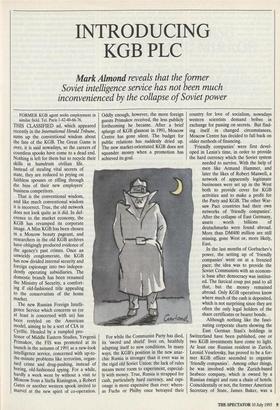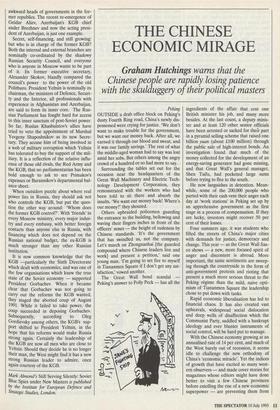INTRODUCING KGB PLC
Mark Almond reveals that the former
Soviet intelligence service has not been much inconvenienced by the collapse of Soviet power
FORMER KGB agent seeks employment in similar field. Tel. Paris 1-42-40-66-76.
THIS CLASSIFIED ad, which appeared recently in the International Herald Tribune, sums up the conventional wisdom about the fate of the KGB. The Great Game is over, it is said nowadays, so the careers of countless spooks have come to a dead end. Nothing is left for them but to recycle their skills in humdrum civilian life. Instead of stealing vital secrets of state, they are reduced to prying on faithless spouses or rifling through the bins of their new employers' business competitors.
That is the conventional wisdom, and like much conventional wisdom it is incorrect. True, the old network does not look quite as it did. In def- erence to the market economy, the KGB has revamped its corporate image. A Miss KGB has been chosen in a Moscow beauty pageant, and researchers in the old KGB archives have obligingly produced evidence of the agency's past crimes. Once an unwieldy conglomerate, the KGB has now divided internal security and foreign espionage into two indepen- dently operating subsidiaries. The domestic branch has been renamed the Ministry of Security, a comfort- ing if old-fashioned title appealing to the conservatism of the home market.
The new Russian Foreign Intelli- gence Service which concerns us (or at least is concerned with us) has been restyled on the American model, aiming to be a sort of CIA in Cyrillic. Headed by a rumpled pro- fessor of Middle Eastern Studies, Yevgenii Primakov, the FIS was promoted at its launch in the autumn of 1991 as a new-look intelligence service, concerned with up-to- the-minute problems like terrorism, organ- ised crime and drug-pushing, instead of boring, old-fashioned spying. For a while, hardly a week went by without a visit to Moscow from a Stella Rimington, a Robert Gates or another western spook invited to marvel at the new spirit of co-operation. Oddly enough, however, the more foreign guests Primakov received, the less publicly forthcoming he became. After a brief splurge of KGB glasnost in 1991, Moscow Centre has gone silent. The budget for public relations has suddenly dried up. The new market-orientated KGB does not squander money when a promotion has achieved its goal.
For while the Communist Party has died, its 'sword and shield' lives on, healthily adapting itself to new conditions. In many ways, the KGB's position in the new anar- chic Russia is stronger than it ever was in the rigid old Soviet Union: the lack of rules means more room to experiment, especial- ly with money. True, Russia is strapped for cash, particularly hard currency, and espi- onage is more expensive than ever: where- as Fuchs or Philby once betrayed their country for love of socialism, nowadays western scientists demand bribes in exchange for passing on secrets. But find- ing itself in changed circumstances, Moscow Centre has decided to fall back on older methods of financing.
`Friendly companies' were first devel- oped in Lenin's time, in order to provide the hard currency which the Soviet system needed to survive. With the help of men like Armand Hammer, and later the likes of Robert Maxwell, a network of apparently legitimate businesses were set up in the West both to provide cover for KGB activities and to make a profit for the Party and KGB. The other War- saw Pact countries had their own networks of 'friendly companies'. After the collapse of East Germany, assets worth billions of deutschmarks were found abroad. More than DM400 million are still missing, gone West or, more likely, East.
In the last months of Gorbachev's power, the setting up of 'friendly companies' went on at a frenzied pace; the idea was to provide the Soviet Communists with an econom- ic base after democracy was institut- ed. The farcical coup put paid to all that, but the money remained abroad. Only KGB operatives know where much of the cash is deposited, which is not surprising since they are often the only legal holders of the share certificates or bearer bonds.
Although nothing like the fasci- nating corporate charts showing the East German Stasi's holdings in Switzerland have been published, one or two KGB investments have come to light. At least one Russian resident in Zurich, Leonid Veselovsky, has proved to be a for- mer KGB officer seconded to organise `friendly companies'. Among other things, he was involved with the Zurich-based Seabeco company, which is owned by a Russian émigré and runs a chain of hotels. Coincidentally or not, the former American Secretary of State, James Baker, was a guest in a Seabeco hotel on his path-break- ing trip to the new Commonwealth of Inde- pendent States in January 1992. Sources in Moscow suggest that Mr Veselovsky's sub- sequent exposure in the press was the result of KGB (or rather FIS) disapproval: Mr Veselovsky had apparently taken the notion of privatisation too literally for his bosses' tastes, and earned a bit too much for himself. His embarrassment was intend- ed as a gentle warning to others; he remains, by the way, 'unavailable for comment'.
But the KGB has had far more experi- ence in underground capitalism than in the legal sort. The Soviet system was a fertile breeding ground for organised crime in the past, thanks to its countless bottlenecks and prohibitions; the connection between the Communist Party and the mafia was a vital element in what passed for the func- tioning of the Soviet economy. According to Oleg Gordievsky, the former KGB sta- tion chief in London, the KGB was regard- ed as 'the only pure organisation', which had nothing to do with the criminal world. Now, however, retired KGB officials are joining new private businesses and the KGB's morals, particularly at the lowest and worst-paid level, are not what they used to be, as old friends exchange the inevitable favours.
These former KGB officials seem espe- cially good at joining lucrative joint ven- tures with western companies, which is no surprise, since the KGB have the most expertise in handling hard currency. Indeed, while the West sends accountants and economists wet behind the ears to tell Russians how to run a market economy, Moscow has been exporting its own exper- tise in creative accounting, fraud and mis- appropriation. Even the Italians can learn a few lessons. While we talk about sending aid to Russia, six times as much hard cur- rency has left the CIS in the last two years as has been invested or given in aid there. The diamonds which are now flowing out of Siberia, destroying the prices in interna- tional gem markets, are probably being transported by ex-KGB operatives. Traffic in computers and other high technology in and out of Russia is probably ex-KGB- managed. Over the past two years, the few incidents involving the sale of nuclear equipment out of Russia— to western busi- nessmen, and the Polish President Lech Walesa, among others — have all involved shadowy KGB contacts as well.
Germany has been the Schwerpunkt of the export of criminality from the old Sovi- et Union, but it is not just the flood of refugees into western Europe's richest state which created new mafia networks in Berlin and other big German cities. The old Red Army (which still has nearly a quarter of a million troops in Germany) together with the old military intelligence network have been recently implicated in a host of rackets from car theft to drugs smuggling.
Not that such activity is risk-free. Conti- nental police have long been alarmed by violence among émigrés from the ex-Soviet Union. Since the murder of two leading nationalists from Chechenya in London a couple of months ago, Britain has caught up with this latest European trend. The two men, who bought a Marylebone flat for £1 million cash, were apparently engaged in printing money for the would-be indepen- dent Chechen republic. They were mur- dered, curiously enough, on the same day as a number of other independence-seek- ing Chechens around the world: Russia needs Chechenya's pipelines, and prefers not to see the new republic flourish. Usual- ly, such crimes are attributed to the 'Rus- sian mafia'. In fact, the culprits are almost certainly the ex-KGB. But which branch? There are up to 50,000 ex-Soviet citizens with the right of residence in Britain. Some of these people present themselves as refugees from persecution, some are stu- dents, but all are known to the KGB, and all can be made use of, some more than others. In Hamburg, for example, lives Valentin Fallin, the last head of the Inter- national Department of the Soviet Com- munist Party, which co-operated with the KGB in organising subversion across the globe. In August 1991 his personal safe, opened in a raid, was found to contain US$600,000 cash.
The greatest boon to the FIS has been a coincidence: had communism not collapsed at exactly the same time as the Single Mar- ket was established, business would be a lot more difficult. Never before has smuggling been so easy. Never before have western governments and customs authorities been so grateful to receive the assistance of the former KGB, to whom they turn for help in stemming the tidal wave of drugs and other illicit goods flowing from East to West. Such contacts are quite useful for the ex- KGB: co-operation with the western police
is a great way to hone one's own smuggling skills, and no one seems to ask what might have been the connections between Soviet poacher and post-Soviet gamekeeper.
Indeed, with the help of its new western friends, released from hidebound Party control, hardly damaged by defections, the KGB has taken on a new lease of life. Its capacity to recruit in the West has blos- somed as ideological inhibitions wane. Information is power, and the ex-KGB has unequalled files on its former subjects at home and abroad. Whereas the FBI employs some 22,000 people throughout America, Russia's Ministry of Security needs 140,000 agents to supervise a popula- tion about one-fifth smaller.
But it is not just the quantity of contacts which matters to the old KGB, it is the quality. If even genuine émigrés can be manipulated into co-operation because of private peccadilloes, imagine how many people working in foreign governments can still be fatally embarrassed by the contents of Primakov's files. The problem is espe- cially acute in former Soviet bloc countries, particularly Poland and Rumania, which have not purged their old secret services of former KGB agents. In the former Soviet Union, even states whose political leaders publicly assert their independence from Moscow are compromised by the continu- ing security links. At the beginning of March, the Ukrainian security chief signed a co-operation agreement with the Russian security minister, Viktor Barannikov. According to the Ukrainian, the agreement meant that the two ministries effectively `formed one service'. Russian human rights activists, such as Galina Starovoitova, point out that the Uzbek KGB arrest 'subver- sives' in Moscow itself, as if the Soviet Union was still in its heyday. Old KGB hands have hardly bothered to disguise their role in toppling some of the more
awkward heads of governments in the for- mer republics. The recent re-emergence of Geidar Aliev, Azerbaijan's KGB chief under Brezhnev and now the acting presi- dent of Azerbaijan, is just one example.
Secret, self-financing, and still growing: but who is in charge of the former KGB? Both the internal and external branches are nominally co-ordinated by the shadowy Russian Security Council, and everyone who is anyone in Moscow wants to be part of it. Its former executive secretary, Alexander Skokov, blandly compared the council's power to the power of the old Politburo. President Yeltsin is nominally its chairman, the ministers of Defence, Securi- ty and the Interior, all professionals with experience in Afghanistan and Azerbaijan, are said to form its inner core. The Rus- sian Parliament has fought hard for access to this inner sanctum of post-Soviet power. So far, Ruslan Khasbulatov's allies have tried to veto the appointment of Marshal Yevgeny Shaposhnikov as its new Secre- tary. They accuse him of being involved in a web of military corruption which Yeltsin has tolerated to buy the support of the mil- itary. It is a reflection of the relative influ- ence of those old rivals, the Red Army and the KGB, that no parliamentarian has been bold enough to ask to see Primakov's expenses or Barannikov's departmental bal- ance sheet.
When outsiders puzzle about where real power lies in Russia, they should ask not who controls the KGB, but put the ques- tion the other way around: 'Whom does the former KGB control?'. With 'friends' in every Moscow ministry, every major indus- try and every embassy, with better foreign contacts than anyone else in Russia, with financing which does not depend on the Russian national budget, the ex-KGB is much stronger than any other Russian institution.
It is now common knowledge that the KGB —particularly the Sixth Directorate which dealt with economics, and was one of the few organisations which knew the true state of the Soviet economy — supported President Gorbachev. When it became clear that Gorbachev was not going to carry out the reforms the KGB wanted, they staged the aborted coup of August 1991. While it failed to take power, the coup succeeded in deposing Gorbachev. Subsequently, according to Oleg Gordievsky among others, the KGB's sup- port shifted to President Yeltsin, in the hope that his reforms would make Russia strong again. Certainly the leadership of the KGB are now all men who are close to Yeltsin. Should they decide he is no longer their man, the West might find it has a new strong Russian leader to admire, once again courtesy of the KGB.
Mark Almond's Still Serving Silently: Soviet Bloc Spies under New Masters is published by the Institute for European Defence and Strategic Studies, London.




















































 Previous page
Previous page